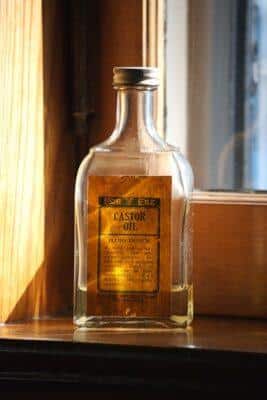If you have ever watched old cartoons or movies, you may have seen more than one reference to castor oil. The scene usually involves someone’s grandmother pushing a huge spoonful of castor oil down a sick person’s throat — with funny faces ensuing due to its horrible taste.
How did castor oil get its start? Does it really do anything for the body? And does it actually taste that terrible?
Let’s take a look at that old-fashioned cure-all.
What Is Castor Oil?
Castor oil is extracted from the seeds, sometimes called “beans,” of castor plants. These seeds are unique in that they contain a fatty acid triglyceride, most of which is ricinoleic acid. Although this type of fatty acid is found in other types of plants, such as cottonseed, it is only found in minute quantities. Castor oil is about 90 percent ricinoleic acid.
It’s important to remember that eating the seeds themselves will cause death. Depending on your size, as few as five seeds are considered a fatal dose. There is no antidote. The oil, though, has no trace of the poison (called ricin) in it.
Native to India, this plant has been mentioned in written history since ancient times, and was used very regularly by our ancestors for a wide variety of health problems.
How Did Our Ancestors Use Castor Oil?
The fact that there were few actual physicians — coupled with the hard truth that there were not very many pharmaceutical drugs 150 to 200 years ago — left our ancestors with very few choices. Anything from Mother Nature was pressed into service in hopes that it would at least provide relief from symptoms while the body healed, or that it might actually do something to cure the problem.
One thing that is well-known about castor oil is that it is an irritant to the colon. So, why would someone take it? Simple: It cured constipation within hours. Many a grandmother was concerned with her family’s bowel movements, which is why just about any kind of tummy ache or nausea usually resulted in a big tablespoon of castor oil “just to be sure.”
Beet Powder: The Ancient Secret To Renewed Energy And Stamina
Indigestion and dysentery were very common in pioneer times, often due to poor food quality or cleanliness. Again, it was castor oil to the rescue.
Castor oil also has an interesting property in that it doesn’t freeze. That made it valuable to keep around in the winter months, as it could be used to oil sticky or frozen machinery parts.
This oil has a stimulating effect on the body. New mothers who had a difficult time producing enough milk for their baby were often told to rub castor oil on the breasts to increase milk flow. This same remedy was also suggested for sore breasts and blocked milk ducts. If a baby was late in coming, a few tablespoons of castor oil were the general recommendation to induce labor. Although there is no scientific evidence to back this up, there are plenty of personal stories which relate that folk remedy actually worked.
Midwives and other women also suggested that rubbing castor oil on the abdomen each morning and night would relieve menstrual cramps.
Castor oil is also known for improving skin health. Pioneer women used it for everything from preventing stretch marks to healing diaper rash, as well as other types of skin problems, including killing lice, preventing hair loss, and stopping dandruff. Since castor oil does contain antimicrobial, anti-inflammatory, and anti-fungal compounds, it is very likely that this can work quite well.
One pioneer woman left some advice for those preparing to travel out West: “No one should travel without medicine, for they are sure to suffer from a complaint. Every family should have a quart of the best rum, a quart of castor oil, and a large vial of peppermint essence.”
Growing Your Own Castor Plant
Castor plants (Ricinus communis) are beautiful, with leaves as large as a dinner plate. However, they are difficult to grow in areas that receive snow or hard frosts. New seeds would need to be nurtured every year. In the South and West, castor plants can grow to be small trees, approximately 15 to 20 feet high.
The seeds are safe to handle, but, again, not to eat. If you have toddlers, this is probably not the plant for you.
Otherwise, castor plants grow nicely in full sun in average or compost rich soil. They appear to need very little care and are quite beautiful.
Making your own castor oil is a bit complicated. The seeds need to be dried, then hulled. The hulled seeds are then boiled to remove the ricin. After boiling, the seeds are then pressed to extract the oil. This is extremely labor intensive, so you might want to consider simply stocking up on a good supply since it is, currently, rather inexpensive and, unlike other oils, does not go rancid when stored out of sunlight.
Other Uses … Oil Lamps?
Thomas Jefferson placed castor plants around his property in hopes that it would kill the gophers and moles that plagued his garden. It didn’t work. The oil does repel moles, but not the plant itself. Jefferson suggested this remedy to George Washington. Jefferson, it is said, loved to invite Washington to visit his garden, where he somehow managed to nurse one plant to a staggering 22 feet in height.
In a pinch, castor oil works great in oil lamps. It burns very cleanly and was used for this purpose by the ancient Egyptians.
It was also called “Palma Christe” in ancient times, as the large leaves were said to look like Christ’s hands. It is possible that after people found out about its medicinal qualities, they believed the plant was sent from God.
*This article is for informational purposes only and is not intended to diagnose or cure any particular health condition. Please consult with a qualified health professional first about this method.
Have you ever used castor oil? What advice would you add? Share your tips in the section below:
Harness The Power Of Nature’s Most Remarkable Healer: Vinegar
 Off The Grid News Better Ideas For Off The Grid Living
Off The Grid News Better Ideas For Off The Grid Living





